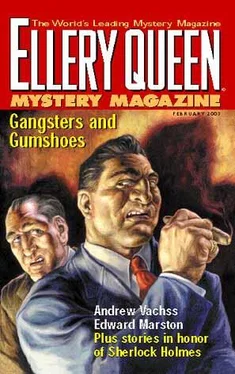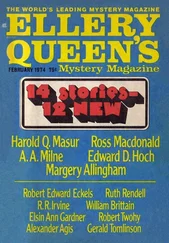Артур Порджес - Ellery Queen’s Mystery Magazine. Vol. 121, No. 2. Whole No. 738, February 2003
Здесь есть возможность читать онлайн «Артур Порджес - Ellery Queen’s Mystery Magazine. Vol. 121, No. 2. Whole No. 738, February 2003» весь текст электронной книги совершенно бесплатно (целиком полную версию без сокращений). В некоторых случаях можно слушать аудио, скачать через торрент в формате fb2 и присутствует краткое содержание. Город: New York, Год выпуска: 2003, ISBN: 2003, Издательство: Dell Magazines, Жанр: Детектив, на английском языке. Описание произведения, (предисловие) а так же отзывы посетителей доступны на портале библиотеки ЛибКат.
- Название:Ellery Queen’s Mystery Magazine. Vol. 121, No. 2. Whole No. 738, February 2003
- Автор:
- Издательство:Dell Magazines
- Жанр:
- Год:2003
- Город:New York
- ISBN:1054-8122
- Рейтинг книги:5 / 5. Голосов: 1
-
Избранное:Добавить в избранное
- Отзывы:
-
Ваша оценка:
- 100
- 1
- 2
- 3
- 4
- 5
Ellery Queen’s Mystery Magazine. Vol. 121, No. 2. Whole No. 738, February 2003: краткое содержание, описание и аннотация
Предлагаем к чтению аннотацию, описание, краткое содержание или предисловие (зависит от того, что написал сам автор книги «Ellery Queen’s Mystery Magazine. Vol. 121, No. 2. Whole No. 738, February 2003»). Если вы не нашли необходимую информацию о книге — напишите в комментариях, мы постараемся отыскать её.
Ellery Queen’s Mystery Magazine. Vol. 121, No. 2. Whole No. 738, February 2003 — читать онлайн бесплатно полную книгу (весь текст) целиком
Ниже представлен текст книги, разбитый по страницам. Система сохранения места последней прочитанной страницы, позволяет с удобством читать онлайн бесплатно книгу «Ellery Queen’s Mystery Magazine. Vol. 121, No. 2. Whole No. 738, February 2003», без необходимости каждый раз заново искать на чём Вы остановились. Поставьте закладку, и сможете в любой момент перейти на страницу, на которой закончили чтение.
Интервал:
Закладка:
He was still quite strong and vigorous, despite tending towards long periods of indolence and rarely exercising. His amazing mind, too, was keen as ever, much like the marvelous Analytical Engine of Charles Babbage, which he greatly admired, if a bit less so having learned that the infamous Professor Moriarty had a hand in the inventor’s mathematical logic.
In the case of Homes, what I noted was a significant increase in testiness and impatience. His need for really puzzling crimes got ever stronger; he was no longer content with reflection, and on several occasions, I’m ashamed to admit, I actually hid his violin under our divan. He would search for it rather aimlessly, but then give up, lie back in the armchair, and brood.
So I was relieved, not a typical reaction for me, to hear the clangorous voice of Inspector Briggs Gerard, our old friend from the Yard, expostulating with our invaluable Swedish landlady, Mrs. Hutsut, below stairs. I had no doubt he was bringing Homes another baffling case he himself could not solve.
When he had been escorted in and was seated with a small brandy in hand, the inspector got right to the matter that concerned him.
“When a rich, important man, a public figure, is brutally killed, you wouldn’t believe the kind of pressure we get from the Home Office, gentlemen.” His face dark, he took a sip of the liquor. “We’re near getting to the bottom of the case, but then I thought, ‘This is just the kind of bizarre affair Mr. Homes relishes, so why not do him a sort of favor — for old times, you might say — and give him something to try his theories on.’ Sometimes, I admit,” he added, “they do make a bit of sense out of messy circumstances.”
On hearing this, Homes, to my delight, was instantly transformed. His eyes, which of late had seemed sunken and hooded, sparkled, and his face, so long sober, became greatly animated.
“You heard the man, Sun Wat!” he exulted. “At last a break in the damned dullness of a crime-free London. The game is afoot! Let’s have all the facts, Gerard. Who’s been killed?”
“None other than Sir Nigel Loring, the industrialist, one of the wealthiest men in all England.”
“Ah,” Homes said. “The one they call Loring the Lecher. One very much for the ladies, it’s said.”
“True enough, I’m sorry to say. Very bad for public morality, too.”
“And who inherits all those lovely Consols shares?”
“Wrong turn, Mr. Homes,” Gerard said, not unhappily, I noted. It wasn’t the first time, I thought, that he got some pleasure thinking that my friend might also be baffled, if only briefly. Even an unsolved murder might not be too high a price to pay for that satisfaction, but perhaps I’m too hard on the estimable inspector.
“No, it ain’t that,” the inspector said smugly. “As you may know, his wife died many years ago. Childless; just a few second cousins and such abroad. He left all his money, and even the big house — Elizabethan, they tell me — to the Tottering-on-the-Brink Hunt Club. He doted on the sport.”
“Enough motive to murder right there,” Homes said, his lips twitching. It was good to see him alive again, so to speak. “How was Loring killed?”
“Unusual weapon, you might say. A bronze statue, three feet tall, and very heavy, weighing over eight stone. I’m pretty strong, played a lot of football in my day, yet I could never lift and swing that at a man’s head. The murderer must have been a giant.”
“Statue, eh? Of what?”
“Neptune, I’m told. Taming a seahorse.”
Homes lifted an eyebrow, and a tiny smile touched his mouth.
“Elementary — Robert Browning did it.”
Then, noting our blank stares, he said, “I see you don’t read our best poet. Well, in a recent poem, he refers to just such a figurine, cast in bronze by Claus of Innsbruck.”
“Wrong again,” the inspector said with barely concealed glee. “It was signed on the bottom by a bloke named Jacob Epstein — and he didn’t do it, either; he’s holed-up in France.”
Homes ignored the jibe, saying, “I didn’t think that Young Turk, Epstein, ever did anything as traditional as a Roman God. Last I heard, he was much farther back to Adam, and causing quite a stir.”
“One of my constables, an artsy-craftsy type, did say Epstein is a bit hairy at the heel.”
“Well, as you yourself would say, this isn’t getting us any forrader. Sun Wat, get me the timetable; we shall have to pay a visit to Loring Hall and take a look.”
When Homes had scanned the timetable, he said, “I fancy the one-ten will do us nicely. By the way, Gerard, have you questioned the servants?”
“Only two around,” was the reply. “All the inside people were let off to attend the big Ludlow fair. That left only the gardener’s dogsbody, a slow-witted lad named Rodney Stone, and the gamekeeper, Micah Clarke.”
Here, noting that Gerard’s glass was empty, Homes handed him the carafe, which was accepted with enthusiasm.
“What do you have on motive?” Homes asked him.
“Lummy,” the inspector said. “Half the county would have liked to do Loring in, but especially the lower classes. He was a devil with their young women. That’s why we first closed in on the gamekeeper. He was betrothed to the downstairs maid, Sue Fone, and she ended up, some weeks ago, exiled to a small boardinghouse miles away, carrying Loring’s child, they say. Clarke, naturally, was furious.”
“Then is he under arrest?”
“Unfortunately not. You see, he’s small, almost a dwarf, barely five feet tall. Muscular enough and wiry, but we can’t see him swinging that statue, not just once but repeatedly, as Sir Bernard Spilsbury testifies — and he don’t make any mistakes.”
“Agreed,” Homes said. “Sir Bernard is a great pathologist.”
“Well, there you have it. The assistant gardener was outside all afternoon, and didn’t see any murderous giant go in. Only Clarke, who was in and out several times, to consult with Loring about poachers, he says. No way even to confirm that, since his master was alone, waiting for one of his lady-loves to come by for a little slap-and-tickle later that day, we’re pretty sure.”
“A fine puzzle,” Homes said, rubbing his hands together. “Well, Sun Wat, if you’ll go downstairs and find us a cab, we’ll be off to the station. We can’t do any more without a thorough examination of the scene, and, of course, the bronze figurine, which presents a most intriguing possibility.”
Naturally, I asked for an explanation of that last comment, but just as naturally, as I should have expected and saved my breath, he would say nothing more.
When we got to Loring Hall, a most impressive pile, Homes immediately went to the murder weapon, which was lying as found on the blood-spattered carpet. It, too, was stained. It was a very professional piece of sculpture, but Gerard scoffed that every seahorse he’d seen, always dead and dried on mantels, was tiny, and this one was huge, with great teeth and a flowing mane. Homes told him, with some amusement, that the bronze animal was mythical, unrelated to the little saltwater fishes.
Having made that clear, he stooped, and with obvious effort, strong as he is, righted the figurine and began to examine it with the aid of his magnifying glass.
“Observe the fine detail, gentlemen,” he said. “A master sculpted this, probably by the ‘lost wax’ method.” He then lifted it, frowned, and said, “I agree with you, Inspector. It would take a very powerful man indeed to wield this in a way to cause the fatal wounds.” He was silent briefly, then said, “Perhaps you’ll be kind enough to bring in the gardener. I have some questions to ask him.” Gerard nodded, left, and returned with a tall, thin boy who tugged his forelock at us. He spoke with a very thick Scots brogue, hard to understand although Homes seemed to have no trouble.
Читать дальшеИнтервал:
Закладка:
Похожие книги на «Ellery Queen’s Mystery Magazine. Vol. 121, No. 2. Whole No. 738, February 2003»
Представляем Вашему вниманию похожие книги на «Ellery Queen’s Mystery Magazine. Vol. 121, No. 2. Whole No. 738, February 2003» списком для выбора. Мы отобрали схожую по названию и смыслу литературу в надежде предоставить читателям больше вариантов отыскать новые, интересные, ещё непрочитанные произведения.
Обсуждение, отзывы о книге «Ellery Queen’s Mystery Magazine. Vol. 121, No. 2. Whole No. 738, February 2003» и просто собственные мнения читателей. Оставьте ваши комментарии, напишите, что Вы думаете о произведении, его смысле или главных героях. Укажите что конкретно понравилось, а что нет, и почему Вы так считаете.












